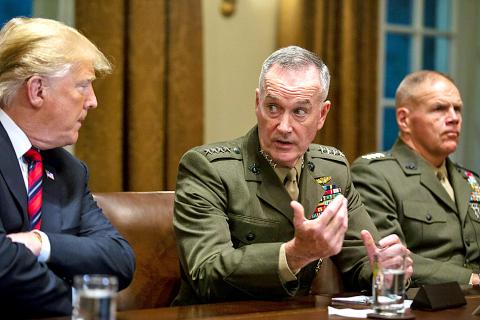US President Donald Trump is not concerned about negative reactions from Beijing after two US Navy warships sailed through the Taiwan Strait on Monday at a time of growing tension between the two superpowers.
“I’m not worried about anything. I don’t worry about things,” Trump said at the White House on Tuesday when asked by a reporter if he was worried about any negative reaction from China.
Asked about his administration’s decision to cruise two US Navy warships through the Taiwan Strait at this point in time, Trump said: “I will leave the decision to myself and my generals and admirals, OK? Not to you.”

Photo: Bloomberg
Trump’s comments came after Pentagon spokesman Lieutenant Colonel Christopher Logan said in an e-mail response on Monday that the guided-missile cruiser USS Antietam and the guided-missile destroyer USS Curtis Wilbur passed through the Strait in accordance with international law.
“The ships’ transit through the Taiwan Strait demonstrates the US’ commitment to a free and open Indo-Pacific,” he said. “The US Navy will continue to fly, sail and operate anywhere international law allows.”
China had a relatively muted response to the ships’ movements.
Asked whether Beijing considered the ships’ passage a provocative move by Washington, Chinese Ministry of Foreign Affairs spokeswoman Hua Chunying (華春瑩) told a regular briefing on Tuesday that China had expressed “serious concern” to the US.
China closely monitored the operation and is keeping abreast of the situation, she added.
It was the second time in three months that the US military had sailed warships through the Taiwan Strait, which the US considers to be international waters.
Chinese warships shadowed the US ships at a safe distance during the maneuver, anonymous US officials said.
At a meeting of the Legislative Yuan, the Ministry of National Defense’s Joint Intelligence and Research Center Director Wang Shao-hua (王紹華) sidestepped a question by Democratic Progressive Party Legislator Tsai Shih-ying (蔡適應) about whether the US military has proposed a series of drills to take place near Taiwan next month, as reported in the local media.
Declining to answer the question directly, Wang said that the US military was reportedly planning to conduct a military exercise near Guam early next month.
Asked by Chinese Nationalist Party (KMT) Legislator Johnny Chiang (江啟臣) whether US warships passing through the Strait would become a regular exercise, Wang said that the defense ministry has no comment, as international law gives US Navy warships right of passage in international waters.

A magnitude 7.0 earthquake struck off Yilan at 11:05pm yesterday, the Central Weather Administration (CWA) said. The epicenter was located at sea, about 32.3km east of Yilan County Hall, at a depth of 72.8km, CWA data showed There were no immediate reports of damage. The intensity of the quake, which gauges the actual effect of a seismic event, measured 4 in Yilan County area on Taiwan’s seven-tier intensity scale, the data showed. It measured 4 in other parts of eastern, northern and central Taiwan as well as Tainan, and 3 in Kaohsiung and Pingtung County, and 2 in Lienchiang and Penghu counties and 1

A car bomb killed a senior Russian general in southern Moscow yesterday morning, the latest high-profile army figure to be blown up in a blast that came just hours after Russian and Ukrainian delegates held separate talks in Miami on a plan to end the war. Kyiv has not commented on the incident, but Russian investigators said they were probing whether the blast was “linked” to “Ukrainian special forces.” The attack was similar to other assassinations of generals and pro-war figures that have either been claimed, or are widely believed to have been orchestrated, by Ukraine. Russian Lieutenant General Fanil Sarvarov, 56, head

FOREIGN INTERFERENCE: Beijing would likely intensify public opinion warfare in next year’s local elections to prevent Lai from getting re-elected, the ‘Yomiuri Shimbun’ said Internal documents from a Chinese artificial intelligence (AI) company indicated that China has been using the technology to intervene in foreign elections, including propaganda targeting Taiwan’s local elections next year and presidential elections in 2028, a Japanese newspaper reported yesterday. The Institute of National Security of Vanderbilt University obtained nearly 400 pages of documents from GoLaxy, a company with ties to the Chinese government, and found evidence that it had apparently deployed sophisticated, AI-driven propaganda campaigns in Hong Kong and Taiwan to shape public opinion, the Yomiuri Shimbun reported. GoLaxy provides insights, situation analysis and public opinion-shaping technology by conducting network surveillance

‘POLITICAL GAME’: DPP lawmakers said the motion would not meet the legislative threshold needed, and accused the KMT and the TPP of trivializing the Constitution The Legislative Yuan yesterday approved a motion to initiate impeachment proceedings against President William Lai (賴清德), saying he had undermined Taiwan’s constitutional order and democracy. The motion was approved 61-50 by lawmakers from the main opposition Chinese Nationalist Party (KMT) and the smaller Taiwan People’s Party (TPP), who together hold a legislative majority. Under the motion, a roll call vote for impeachment would be held on May 19 next year, after various hearings are held and Lai is given the chance to defend himself. The move came after Lai on Monday last week did not promulgate an amendment passed by the legislature that